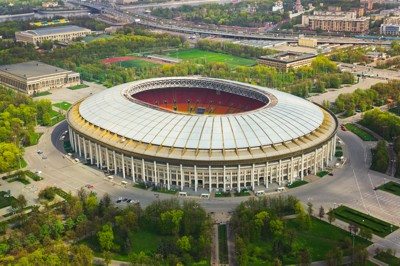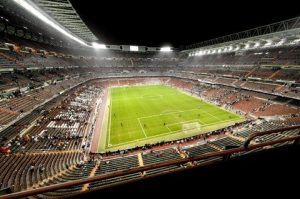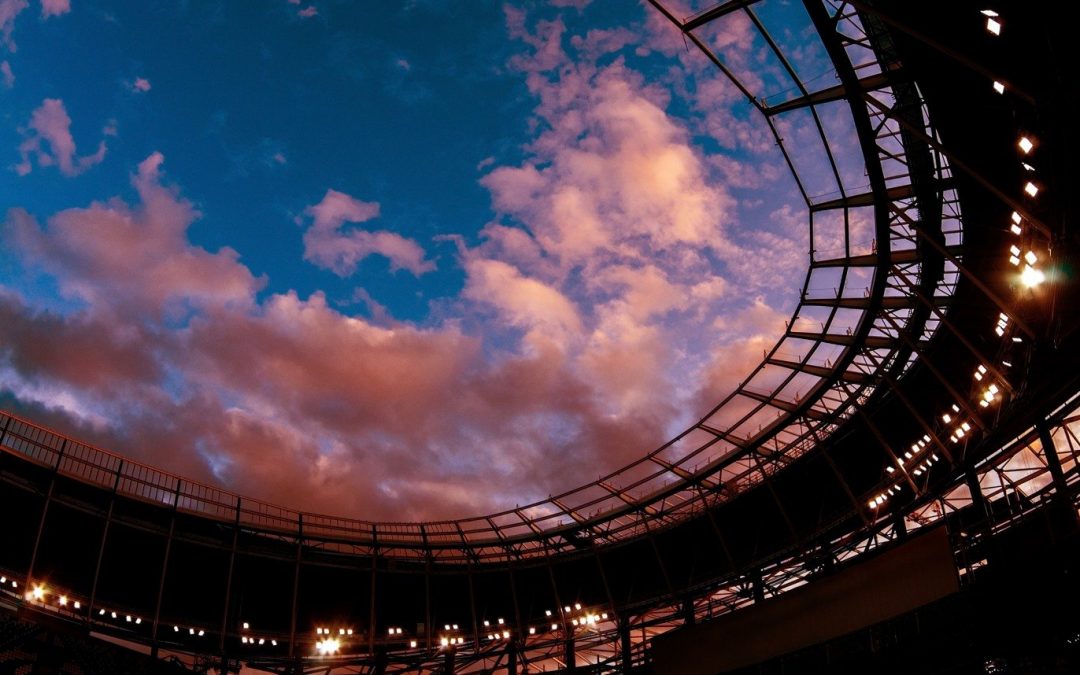Are you all set for your World Cup 2018 trip? Complete your final preparations by reading up on the Luzhniki Stadium and other venues for the World Cup matches.
As football’s biggest tournament returns to Europe, the committee for the 2018 World Cup has allocated and constructed a series of new stadiums to host the games. Russia is truly transforming its venues ahead of the competition, bringing a number of contemporary arenas, erected or modernized for the event. With Moscow’s Luzhniki Stadium at the hub, 12 stadiums have been selected to play host to the matches. Meanwhile, the Luzhniki Stadium itself has been given a makeover for the final. Each of the venues is hosting a minimum of four group games. It’s likely, if you are visiting Russia to attend any of the games, that you’ll be viewing from one or more of these arenas. Here’s a guide to help you decipher each stadium, with some information about how to get from one to the next.
Luzhniki Stadium, Moscow
 The central base for the entire tournament in 2018, the Luzhniki Stadium is based in Moscow and holds up to 81,000 spectators. It’s the largest of the lot and will be the venue for the World Cup final, 2018. The inside of the Luzhniki Stadium was previously torn down and, since 2013, has been rebuilt, modernized and improved. Now this stadium is ready for the eyes of the world to see it, with a new look. It still retains its trademark outer facade, which has been incorporated into the design of the revamped structure. With the renovation, the capacity has been increased and the athletics track has been removed, with the idea of improving the sound and the atmosphere inside. From Domodedovo Moscow Airport, the Luzhniki Stadium is a 50-minute drive. Train travel will take nearer to 2 hours with its various transfers and involves some walking. Knockout games: Round of 16, semi-final, final
The central base for the entire tournament in 2018, the Luzhniki Stadium is based in Moscow and holds up to 81,000 spectators. It’s the largest of the lot and will be the venue for the World Cup final, 2018. The inside of the Luzhniki Stadium was previously torn down and, since 2013, has been rebuilt, modernized and improved. Now this stadium is ready for the eyes of the world to see it, with a new look. It still retains its trademark outer facade, which has been incorporated into the design of the revamped structure. With the renovation, the capacity has been increased and the athletics track has been removed, with the idea of improving the sound and the atmosphere inside. From Domodedovo Moscow Airport, the Luzhniki Stadium is a 50-minute drive. Train travel will take nearer to 2 hours with its various transfers and involves some walking. Knockout games: Round of 16, semi-final, final
Spartak Stadium, Moscow
Also known as the Otkritie Arena, this stadium is smaller than the Luzhniki Stadium and holds about half the amount of people. It is the home of the Spartak Moscow football team and is only 4 years old. It was one of the four venues used for the Confederations Cup in 2017. Spartak had never had their own stadium until this venue was built, instead playing at various different grounds in Moscow. This is an unusual fact in itself, given that they are known to be the most successful team in the history of Russian football. Since being bestowed the stadium, named after them, they took home the first league title in over 15 years in 2016-17. The stadium features statues of the Starostin brothers. The brothers founded the club, with the statues placed pride of place behind one of the goals. The Spartak Stadium is only 20 minutes by car away from the Luzhniki Stadium. Knockout games: Round of 16
Samara Arena, Samara
Holding 44,918, this stadium is still having the finishing touches put to it. It’s also set to be renamed the Cosmos Arena when the World Cup is over. It will then become the new home of Kylia Sovetov, who currently play at the Metallurg Stadion. Futuristic in design, the Samara Arena is a glass dome. Its architecture is intended to be a nod to Samara’s role in the Soviet Union’s space-exploration program. Samara prides itself on being a prominent player in aerospace business and research – hence the reflection of the design. Samara is a 1-hour 40-minute plane journey to Moscow. Knockout games: Round of 16, quarterfinal
Saint Petersburg/Krestovsky Stadium, Saint Petersburg
Another large stadium, but still holding around 20,000 less than the Luzhniki Stadium, the Krestovsky (or the Saint Petersburg Stadium for FIFA tournaments after the World Cup) is quite something. It’s taken over a decade to build and has cost Russia a lot of money – coming in over budget. Nonetheless, it will be ready for the 2018 World Cup and will play home base to Zenit, hosting the Confederations Cup final last year. Saint Petersburg to Moscow takes about an hour to fly. Knockout games: Round of 16, semi-final, third-place play-off
Kazan Arena, Kazan
This venue is notable for having the largest outside screen in Europe, running across one stand’s entire outer wall. Holding 45,379, the completed arena is the home ground for Rubin Kazan, and has been since 2013. The flight from Kazan to Moscow takes about 1 hour 30 minutes. Knockout games: Round of 16, quarter-final
Mordovia Arena, Saransk
This is a brand new stadium and, once finished, will play host to FC Mordovia Saransk, a club formed when two local teams merged in 2005. Though the capacity of the stadium will top 45,000 for the World Cup, it will be reduced to 28,000 after the tournament to be more in line with the needs of its permanent tenants. Mordovia is a republic of over 800,000 people located about 500 kilometers south-east of Moscow. Knockout games: None
Kaliningrad Stadium, Kaliningrad
This new venue stands out from the rest because it’s not on Russia’s mainland. Kaliningrad Stadium sits between Poland and Lithuania, slightly further east than Stockholm and Warsaw. Nonetheless, its involvement in the World Cup 2018 is key – it will play host to 35,000 fans and become the home of FC Baltika Kaliningrad thereafter. Knockout games: None
Rostov Arena, Rostov
Rostov is undergoing a major overhaul and the Rostov Arena will be part of a new development in the city on the banks of the Don River. It is found 1,000 kilometers south of Moscow. Knockout games: Round of 16
Fisht Stadium, Sochi
Notably the home to the Winter Olympics in 2014, Sochi’s Fisht Olympic Stadium is one of Russia’s most intriguing venues for the World Cup 2018. Originally an indoor venue, it has since been converted into an open-air football stadium and is not the home of any teams. This stadium is government owned. Sochi is a 2-hour flight from Moscow. Knockout games: Round of 16, quarter-final
Nizhny Novgorod Arena, Nizhny Novgorod
This brand new stadium is one of Russia’s most scenic. It sits at the confluence of the Volga and Oka rivers. Stunningly located next to the Alexander Nevsky Cathedral it’s also a stone’s throw from the Nizhny Novgorod Kremlin which is across the river. It’s an impressive backdrop for the games that will be played there. After the tournament, FC Olimpiyets Nizhny Novgorod will move into the stadium. Knockout games: Round of 16, quarter-final
Yekaterinburg Arena, Yekaterinburg
This venue has been recently remodeled but required another refurbishment in order to be World Cup-ready. It has drawn attention ahead of the tournament for the fact that the top of the stand behind one of the goals is designed to look as if it rises so high it aligns directly behind the very high roof. Knockout games: None
Volgograd Arena, Volgograd
Volgograd is located an hour and a half, by air, from Moscow. The stadium is a brand new build and has been designed and constructed specifically for the tournament. It features a striking open-lattice design. It will go on to become the home stadium of FC Rotor Volgograd, built where their old stadium — demolished in 214 — once stood. Knockout games: None
Giving You a VIP World Cup Experience
 AssistAnt provides a wide range of Global Concierge VIP services in most countries around the world. We’re here to help you turn your trip to the 2018 World Cup into one of luxury and ease. Our services include anything and everything from “Meet & Greet” airport assistance, transportation services and travel arrangements – meaning we can help get you from city to city, venue to venue. With us, your time in Russia will be seamless. We will take care of the logistics, while you enjoy the sport. Contact us for more information.
AssistAnt provides a wide range of Global Concierge VIP services in most countries around the world. We’re here to help you turn your trip to the 2018 World Cup into one of luxury and ease. Our services include anything and everything from “Meet & Greet” airport assistance, transportation services and travel arrangements – meaning we can help get you from city to city, venue to venue. With us, your time in Russia will be seamless. We will take care of the logistics, while you enjoy the sport. Contact us for more information.








